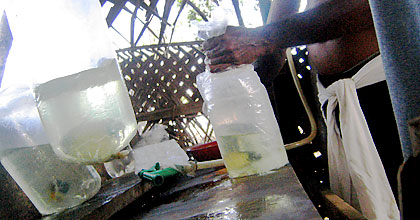WILD FISH STOCKS DRYING UP

Workers prepare fish to be transported from Kalmunai to Colombo, where
they will be flown to countries like the United States.-Gea Swee Jean
To be fair, tsunami damage to coral reefs and their marine inhabitants has been far less than feared.
But coral bleaching, coral mining and destructive fishing methods are among the factors that have resulted in reef damage even before the tsunami, according to Mr Arjan Rajasuriya, research officer at the National Aquatic Resources Research & Development Agency.
He said: "All that one can say about the future of these reefs is that they will continue to decline in status, even within marine protected areas as reef destruction is uncontrolled in Sri Lanka."
This spells trouble for Sri Lanka's marine fish, as coral-dependent species make up about 60 percent of its 933 marine fish species, according to fish database FishBase.com.
Worse, veterans like Mr Upali observe more are entering the diving trade because it earns more than fishing. Like his son, 24-year-old Rohan, who estimated he could earn 30,000 rupees (S$500) a month by diving. For a fisherman, just half this sum is good pay.
With little alternative employment, relief for the marine fish does not come by stopping the diving. Like their prey, divers are only trying to survive.
Government monitoring and enforcement might help, but this is poor. Export of some 30 species of marine fish is either prohibited or restricted by law, but without knowledge about the latest health of each species, some species that might now be classified as "restricted from export" - thus requiring permits - are not.
As Ms H. P. K. Hewapathirana, fishery biologist at the Department of Fisheries and Aquatic Resources, said: "When we issue permits, we need to know how many of each species we have in our coastal waters, but we don't have any records.
"The export data we get is of the weight of the water, so we don't know the number of fish being exported," she said.
With all these problems, right now, the only hope must lie with those who dive to live.
Rohan said: "We don't go to the same place every day to prevent over-fishing."
The fear is many more divers think like Mr Ruwan Kumaran, 33, who prefers diving along the broken reefs of Kattankudi, though the catch has plunged.
"One year, one and a half years later, the catch will improve," he predicted cheerfully.
' * ' * ' * '
« prev